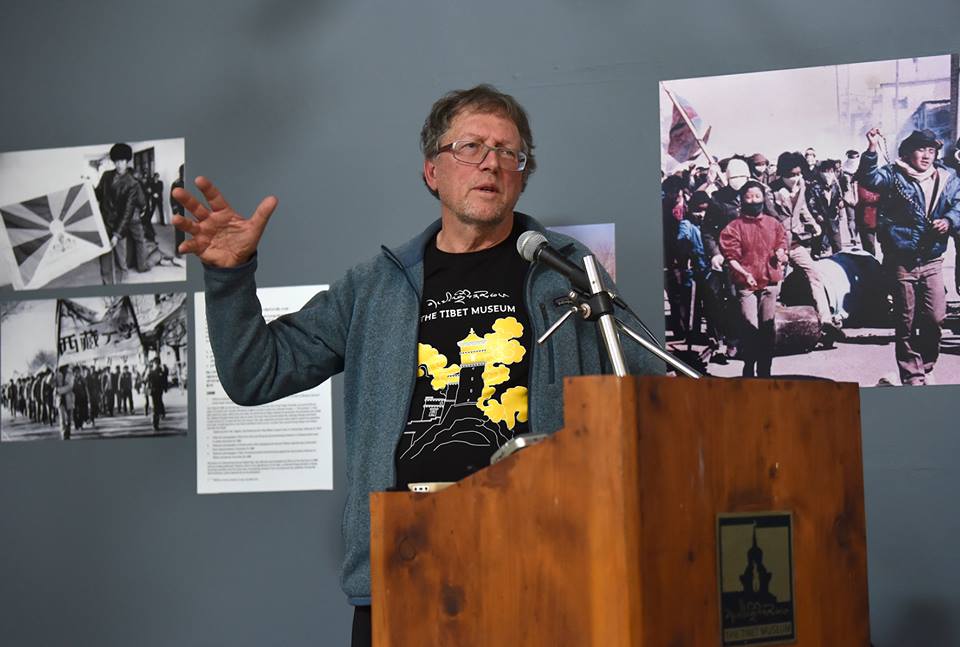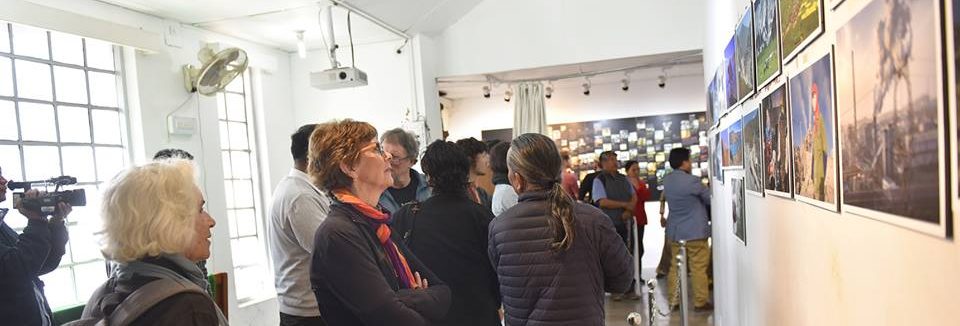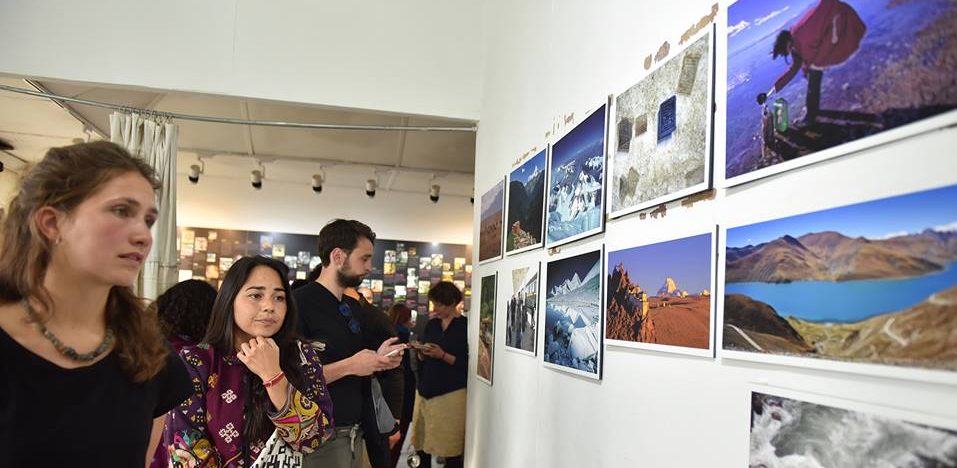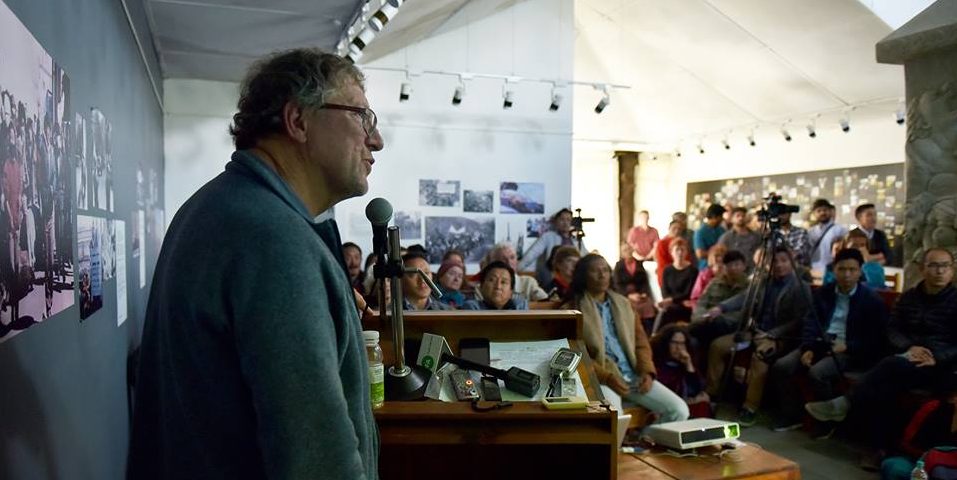The Tibet Museum Tibet Awareness Talk Series Program Report: “Why Tibet Matters” by Michael Buckley

Dharamsala: To commemorate World Water Day, the Tibet museum bi-monthly talk-series program held in the Tibet Museum located in McLeod Ganj, Dharamsala on the very day of 22nd March 2019. The Talk series this month was presented by Mr Michael Buckley, who spoke on the topic “Why Tibet Matters.” Mr. Buckley is the writer of the book ‘Meltdown in Tibet‘ and has directed several movies on Tibet including ‘From Nomad to Nobody’, ‘Meltdown in Tibet’ and ‘Plundering Tibet.‘
The talk series program started with a beaming Tibetan song Crystal wings performed by Mrs Kelsang Chukie and her team to avail an ambience of tranquillity and clear mindset amongst the audience.

Kelsang Chukie and her team performing a cultural Tibetan song.
After the song, Mr Buckley glided through his presentation with an opening statement that, “there’s nothing more important than Water.” Water being the core medium for the existence of every living being on earth serve every purpose either through direct consumption or indirectly via mining or others. He asserted that it’s crucial for the world to discuss the current environmental issues of Tibet as Tibet supplies fresh water to more than ten countries downstream in Asia.
With the photo exhibition in the next room, he took the audience to the realm of storytelling where he explained Tibet’s environmental condition before the Chinese occupation. He also focused on Tibetans idea of the sacred landscape where Sacred Valley, lakes and rivers were kept untouched with a restriction to hunt, shoot or fish. The Tibetan pilgrims follow the ritual to circumambulate around the sacred mountain like Khawa Karpo in Kham and restrain all offence against the environment.
After a brief introduction to concerning Tibet issues and Tibetan’s response towards nature, the speaker then shed light on the two main casualties brought by the Chinese government to Tibet. Tibetan wildlife is poached for fur and medicines and forests were chopped off for the manufacture of chopsticks and furniture. When a devastating flood in the Yangtse River happened, the investigation led by the Chinese scientist found and confirmed that the core reason was due to deforestation.
Forming a loop of a story with the photo slides, the speaker then moved to Dams in Tibet and the establishment of Train facility that led to the exploitation of the environment. There have been a number of bigger dams built in Tibet for the hydropower and other purposes that negatively affected both wildlife and the vegetation. The Train facility brought more military and micro workers into Tibet which made everything economically viable and had accelerated every point of exploitations in Tibet in terms of damming, mining, groundwater exploitation.
Flipping through, the speaker then continued with the picture depicting the core reason for the meltdown of Glacier was burning of the fossil fuel. The soot when landed on the glacier attracted more sun rays and speeded up 50% of the melting. The speaker acclaimed that the solution is clear, if the burning of fossil fuels is ceased especially in China and India then the soot shall clear up in a month.
The satellite picture of lakes and dams made Lithium and Uranium mining noticeable. Chinese government hired Chinese workers for mining and Tibetans were left unemployed bearing all the pollution and the circumstances of ecological misconducts.
Eventually, the speaker drove the slide to the photo of Bhutan Crane festival that signifies the organic farming and an exemplary example of pay respect to the nature tradition by Bhutanese people to their children.
The presentation then wrapped up on a positive note from the speaker as he said, “It is not all bad news, it’s just the question of changing the attitude” To justify this context he took China as an example. Panda as a symbol of China used to hold very low regard before as they were hunted and skinned. The whole attitude towards Panda changed when World Wide Fund for Nature (WWF) made Panda as their logo sign. Suddenly Panda became a sacred animal of China and shooting a Panda can get one arrested.


Visitors exploring the Photo exhibition.
The speaker took off from podium saying “it’s a question of attitude, you can’t change people attitude, you just need to educate them” and then introduced two final songs White Crane of the God and Praise to the Potala before the audience dispersed for the photo exhibition in the next room.
The talk series program ended with a thank you note from Tibet Museum staff to the guest speaker, entertainment team and house packed audience present on that day.
~Reported by Kunga Choedon

The audience assembled for the Tibet Museum talk series program
